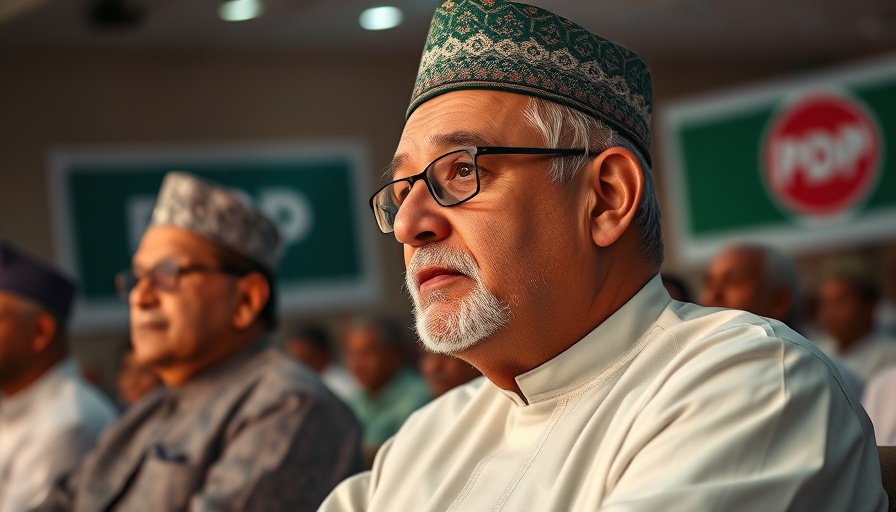
Understanding the Crisis Within the PDP
The ongoing turmoil within the People's Democratic Party (PDP) is not just a matter of party politics—it's a journey through a tangled web of self-inflicted wounds. The recent statements by the acting national chairman, Umar Damagun, highlight a consensus among party leaders: the issues the PDP currently faces stem largely from internal mismanagement and conflicting ambitions.
The video 'PDP Crisis: Problems Are Self-Inflicted - Damagun' highlights crucial insights into the ongoing issues within the party, prompting a deeper analysis of the implications for Nigerian politics.
Election Aftermath: A Catalyst for Turmoil
The root of the PDP's struggles can be traced back to the aftermath of the 2023 presidential primaries. Many within the party felt the results did not reflect their aspirations, leading to a breakdown in unity. According to political analyst and member of the PDP Youth Alliance for Good Governance, David Godwin, the perception that the election was credible has only intensified the dissent among party ranks. Members who felt marginalized have engaged in divisive maneuvers, often counterproductive to the party’s growth and systemic integrity.
Structural Vulnerabilities: A Lack of Leadership Cohesion
The controversy surrounding the position of national secretary illustrates a clear failure in leadership frameworks within the PDP. The ineffectiveness of the national committee to decisively address dissent and internal conflicts has allowed tensions to fester unchecked. Damagun himself acknowledges that these crises are self-inflicted; however, the challenge remains: how can the party move past these internal quarrels? His acknowledgment of the need for restructuring indicates a recognition that systemic weaknesses must be addressed to prevent recurring issues.
The Role of Discipline in Party Dynamics
A significant aspect contributing to the PDP's disarray is its approach to discipline. Godwin emphasized the party's constitutional provisions meant to tackle anti-party activities, yet these have remained largely unexercised—resulting in a culture of impunity. If the leadership fails to take stronger positions against those undermining the party from within, it sends a message that dissent is permitted, further complicating efforts to reconcile fractured factions. The calls for discipline resonate with the urgent necessity for the party to restore order and direction.
The Continuously Shifting Power Dynamics
Former governor Nyesom Wike's influence within the PDP, particularly following his withdrawal from the agreements intended to stabilize the party, raises questions about individual power within political structures. Critics argue that Wike’s actions underscore a dangerous trend where one individual's interests can continuously override collective decisions, contributing to the fracturing of party unity. This dynamic stresses a need for a collective allegiance to the PDP rather than allowing individual ambitions to overshadow the party’s agenda, especially as the 2027 elections loom closer.
The Path Forward: Unity as a Strategy
Looking ahead, the upcoming National Executive Committee (NEC) meeting slated for June 30th could serve as a turning point for the PDP. The meeting will not only address the contested position of national secretary but also provide a platform for larger discussions around consent, unity, and shared vision as they pivot towards the 2027 elections. Experts emphasize that without a committed effort to fortify the party's unity and address grievances, the PDP risks becoming irreparably fractured.
Conclusion: Self-Reflection as Strategy
The honest assessment by Damagun of the party's woes is a necessary first step toward healing. However, the journey to recovery will necessitate more than mere acknowledgment of issues; it will require decisive actions, transparent governance, and a collective commitment from all tiers of party leadership to uphold the principles that define the PDP. As the political landscape in Nigeria continues to evolve, the PDP must rediscover its foundational values and restore faith among its voter base.
For those concerned with the future of political parties in Nigeria and their governing capabilities, the unfolding dynamics within the PDP serve as a cautionary tale. The Somalia of challenges faced by the PDP highlight the importance of a cohesive strategy and robust party structures in the pursuit of national leadership.
 Add Row
Add Row  Add
Add 


 Add Row
Add Row  Add
Add 

Write A Comment